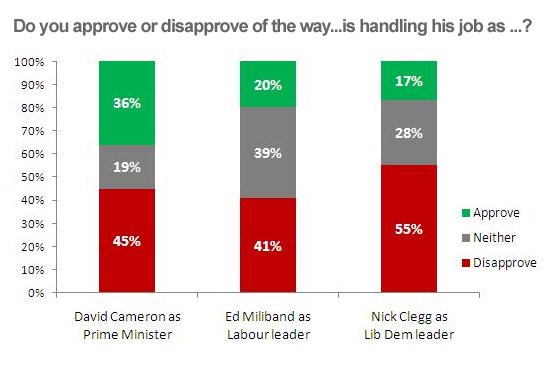The November Political Report
The November Political Report
Our voting intention figures from early in November show that the Labour lead has fallen slightly to four percentage points. Meanwhile, with economic concerns dominating the news, respondents are generally pessimistic about the Eurozone crisis, unemployment and their own financial prospects.
Leader ratings
- While Ed Miliband?s net approval rating (total who approve minus the total who disapprove) remains fairly steady at -21%, David Cameron and Nick Clegg both see a drop in support
- Mr Cameron?s rating has fallen from -5% to -9% while Mr Clegg has fallen from -35% to -38%.
- Conservative voters are still firmly behind Mr Cameron with 86% approving of his job performance and 24% strongly approving.
- Only 9% of Tories are on the fence saying they neither approve nor disapprove
- Only 43% of Labour voters approve of Ed Miliband?s job performance, down from 51% the last time this question was asked four weeks ago. This is driven by a large shift to ?neither approve nor disapprove? which is now at 39% compared to 33% in October
- Among Lib Dem supporters, Nick Clegg enjoys a 57% approval rating, up from 50% last month. Like Ed Miliband?s shift, this is because of a change in the number saying ?neither approve nor disapprove? dropping from 33% to 27%
Eurozone crisis and economic worries
- 48% of likely voters expect their personal financial situation to get worse in the next 12 months while only 17% think it will get better
- Almost half (48%) of likely voters think the UK economy is currently shrinking vs. only 11% who think it is growing. 36% think the economy is neither growing nor shrinking
- On the Eurozone debt crisis, 45% of likely voters think the government is handling the situation badly while 22% think it is being handled well.
- However respondents are not confident that there is much the UK government can actually do:
- 46% think the UK has less influence than other countries, 14% think the UK has more influence while 33% think we have as much influence as other countries.
Government approval and issues
- Approval is down 7% from last month?s survey and the net approval rating (total who approve minus the total who disapprove) has plummeted from -14% to -24%
- When asked how the government is handling key issues, the net approval rating for each one has fallen since the last poll back in October
- In particular, the percentage approving of the government?s handling of the economy has fallen from 27% to 23% with the net rating falling from -25% to -30%
- On unemployment the picture is even more grim with 61% saying the government is handling it badly (up from 55% last month) making for a net rating of -46% (worse than the -40% last month). This survey was conducted before the latest data was released showing unemployment rising to 2.62 million
- News about the impending teachers strike has clearly had an impact with the net approval for education falling to -17% compared to -8% last month
Opinium’s next voting intention survey should appear on this site by Tuesday 22nd November.




Opinium Research carried out an online survey of 1,962 GB adults aged 18+ from 4th to 7th November 2011. Results have been weighted to nationally representative criteria.
Interview Method and Sample
This survey is conducted online by CAWI (computer aided web interviewing), using Opinium?s online research panel of circa 30,000 individuals. This research is run from a representative sample of GB adults (aged 18+ in England, Scotland and Wales). The sample is scientifically defined from pre-collected registration data containing gender, age (18-34, 35-54, and 55+), region (North East, North West, Yorkshire and Humberside, East Midlands, West Midlands, East of England, London, South East, South West, Wales, and Scotland), working status and social grade to match the latest published ONS figures.
Opinium also takes into account differential response rates from the different demographic groups, to ensure the sample is representative.



